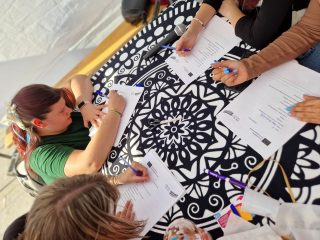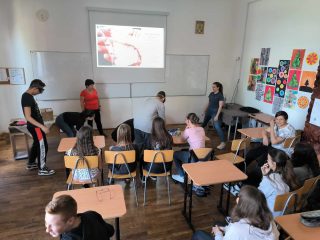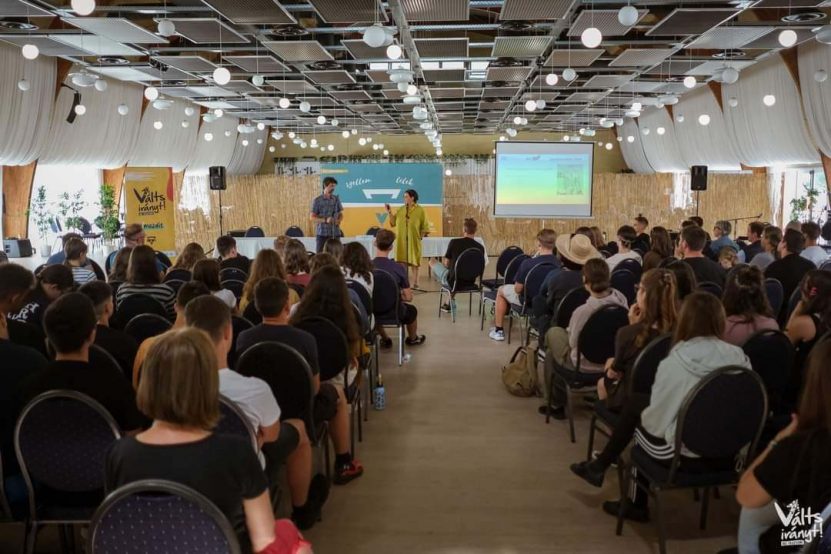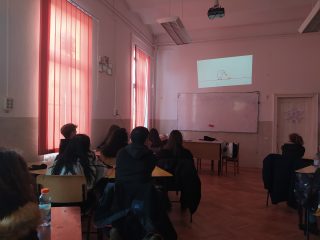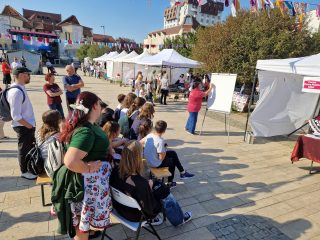Erasmus + – Life for Youth – Testing the Curriculum

Life for Youth
2022-3-RO01-KA210-YOU-000098044
Testing the Curriculum
As part of the Erasmus+ Life for Youth project, two partner organizations have developed a shared curriculum that can support organizations conducting drug prevention activities and professionals working with young addicts. The manual, titled “Preventing Substance Use in Young People with the Portage Method and Life Coaching” – as its title indicates – is divided into two parts: the Bonus Pastor Foundation presents life coaching and self-awareness techniques, while MRE KIMM outlines the practice of the Portage method as applied in prevention.
A primary focus during the development of the manual was practicality, ensuring it provided concrete knowledge and methodological guidance in an accessible format. For this reason, the material underwent multiple rounds of testing.
Both Bonus Pastor and MRE KIMM assessed the curriculum’s strengths and weaknesses within their drug prevention programs. These programs emphasized awareness-raising, drug education, motivating individuals to seek help, and using life coaching techniques to prevent substance use and addiction. Collecting feedback from participants was crucial for evaluating the curriculum’s impact and identifying new directions for improvement. The experts conducting these tests documented their observations in detailed written reports.
The curriculum testing followed specific criteria: raising awareness among young people, learning prevention techniques and problem-solving skills, developing conflict resolution abilities, enhancing quality of life, and fostering healthy personal relationships.
During the initial testing phase, the profile of young participants was analyzed to gauge their attitudes toward drugs and substance use, including those who had never used substances, had used them once or infrequently, used them regularly, or were already addicted. Various prevention activities were organized, such as open days at the Therapy Centre in Ozd, Mureș County, with the participation of university students from Cluj-Napoca and a group of pupils from Sovata. Similar events were held in Crasna for young people from different localities in Cluj County. Based on interviews and verbal feedback, the foundation’s specialists selected which annexes and lesson plans to use in subsequent tests. The material was then tested in multiple locations, including Gherla (Cluj County), Izvoare (Harghita County), Târgu Secuiesc (Covasna County), and Băile Tușnad (Harghita County). Participants, aged 14 to 25, came from diverse backgrounds, ranging from nurturing Christian families to those living with social disadvantages or in dependent families. The analysis also considered their drug use categories, whether non-users, occasional users, regular users, or addicts.
In Gherla, 41 students aged 14-19 attended a school-organized summer camp focused on drug prevention, covering topics such as the effects of psychoactive substances, addiction development, and seeking help. Introductory activities from the manual fostered an environment conducive to honest discussions. It was revealed that some students had used psychoactive substances, including regular use. They were keen to learn more about their addiction risk and prevention strategies. Self-awareness questions confirmed that drug prevention efforts are more effective when combined with personal development.
In Izvoare, two prevention sessions were conducted for 30-35 children from orphanages, with the participation of German volunteers who spoke Hungarian. The volunteers appreciated the interactive approach to youth prevention. These sessions focused on life coaching elements like decision-making, envisioning the future, and self-assessment. The orphans, attentive to the presentations, reflected on how decision-making relates to self-worth. The program was evaluated as dynamic, interactive, and effective by students, volunteers, and camp organizers through verbal feedback.
At the “Bod Péter” Pedagogical High School in Târgu Secuiesc, a structured series of drug prevention sessions took place within the same class. The program began with topics on addiction, alcoholism, drug use, and violence, progressing to self-awareness, self-assessment, and decision-making life skills. Although there was no written evaluation, feedback from teachers and students was positive. The insistence of students on involving addiction counselors at year-end celebrations, and their continued contact, highlighted the importance of sustained collaboration between schools and support organizations, proving long-term prevention is more effective than isolated events.
After this testing phase, an online evaluation session identified areas for improvement: the life coaching section required additional exercises, and some Portage exercises were less relevant. These findings led to further revisions.
The reviewed manual was evaluated by experts from various fields, including a psychologist, addiction counselor, lawyer, mental hygiene specialist, and lecturer. They assessed the content’s accuracy, methodology, lesson plan practicality, and the integration of life coaching with the Portage method. An editor also checked the content for clarity and structure. The experts agreed the manual was now professionally robust, practical, and user-friendly.
Before publication, the manual underwent extensive testing in Romania and Hungary, involving 165 young participants aged 14-30 across two rounds. In Hungary, testing included two groups of 15 participants each, while in Romania, nine groups across multiple counties and towns participated. MRE KIMM’s and Bonus Pastor Foundation’s drug prevention activities took place in localities such as Ráckeresztúr, Sub Cetate, Bedeni, Șumuleu Ciuc, Gheorgheni, and Târgu Mureș, among others. Following most activities, participants completed evaluation questionnaires.
In Budapest, MRE KIMM tested the manual during interactive prevention sessions with 30 participants from the “Válaszút a szenvedélybetegekért” Foundation. Sessions included young people aged 18-30 and their educators, focusing on Portage model feedback techniques and life coaching activities like the Johari window. Group games encouraged open sharing, which was valuable for those already facing or at risk of addiction. Small group discussions helped participants internalize theoretical content.
At the “Change Direction!” Christian youth festival in Sub Cetate, young people from Transylvania and Ukraine, mainly from Christian backgrounds, engaged in discussions on staying within their comfort zone versus taking risks and directed freedom. The presence of a former addict sharing personal experiences had a significant impact, bringing addiction issues into perspective and sparking questions. These activities highlighted the challenge of managing peer pressure, even for youth with strong support systems.
The “Let’s Talk Frankly” camp in Bedeni involved socially vulnerable youth aged 14-18, many directly impacted by addiction in their families. Activities focused on psychoactive substances, addiction, family dynamics, and recovery options. Participants were more concerned with helping addicted loved ones than self-reflection.
In Miercurea Ciuc, at the CSIT Youth Meeting, prevention topics from the manual were presented, with participants from across the region. In Târgu Mureș, local festivals and Reformed College classes served as further testing grounds. The “Marosvásárhelyi Forgatag” and “Ő az út!” Christian festival featured interactive stands and self-awareness activities.
Feedback confirmed that the manual, with its practical approach, collection of games, and adaptability, is effective and valuable for educators, clergy, and social workers. The combination of the Portage method and life coaching proved especially beneficial in prevention efforts.
Student feedback emphasized:
- Empathy and Understanding: A non-judgmental approach created a safe environment for discussions.
- Self-Awareness and Coping Skills: Found to be vital for crisis management and personal growth.
- Supportive Relationships: Trusted adults were seen as crucial for seeking help.
- Acceptance and Motivation: Young people valued being understood and motivated.
- Real-Life Testimonies: Participants highly appreciated personal stories from recovered addicts.
A participant’s remark on the Johari window activity encapsulated its impact: “This reminded me how important self-awareness is and how much more I need to explore myself. The honesty in the group encouraged me to face my hidden parts.”
In summary, the guide is a practical tool for drug prevention, fostering youth self-awareness and interpersonal skills, contributing to their development as resilient, responsible adults. It will be promoted at professional training conferences to foster dialogue and collaboration between youth and experts, supporting effective prevention initiatives.
